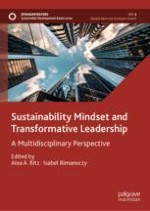2021 | OriginalPaper | Buchkapitel
6. Anthropocene and the Call for Leaders with a New Mindset
verfasst von : Isabel Rimanoczy
Erschienen in: Sustainability Mindset and Transformative Leadership
Aktivieren Sie unsere intelligente Suche, um passende Fachinhalte oder Patente zu finden.
Wählen Sie Textabschnitte aus um mit Künstlicher Intelligenz passenden Patente zu finden. powered by
Markieren Sie Textabschnitte, um KI-gestützt weitere passende Inhalte zu finden. powered by
